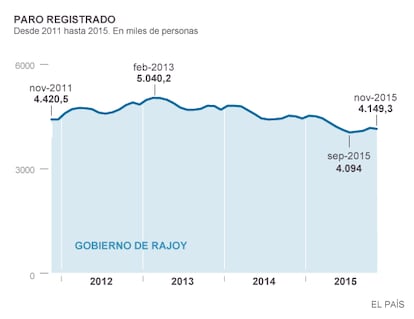Rajoy legislature ends with fewer jobs than his predecessor left behind
Number of social security contributors is down 25,000 compared to November 2011 Unemployment, however, has fallen to 4.1 million, nearly 400,000 below level of four years ago

November was a positive month for the Spanish job market, with the latest figures released today showing that unemployment has fallen, and the number of new contributors to the social security system – a measure of job creation – has risen.
But the improvement in the labor market, which has been in dire straits since the global economic crisis hit in 2008, has not been enough for the current prime minister, Mariano Rajoy, to head into the upcoming elections with better figures than those he found when he came to power in 2011.
The government’s “aggressive” labor reform did not stem the destruction of jobs within the Spanish economy
Last month saw an average of 17,223,086 workers signed up with the social security system. But in November of 2011, when the last elections were held, the figure was slightly higher, at 17,248,500. And the following month, when the Popular Party took the reins of power, the number fell to 17,229,500. Both of those figures are above this November’s level, according to the Labor Ministry data released today.
In terms of registered unemployment, the figure shows an improvement. Four years ago, the Active Population Survey (EPA) showed a total of 4,512,100 people registered unemployed in Spain. The current figure is 4,149,300. But that reduction is exclusively due to a fall in the number of people who are of working age – the active population.
When the current term of Mariano Rajoy began in 2011, the country was mired in the second recession of this long economic crisis, the effects of which are still being felt. Several weeks later, the government approved an “aggressive” labor reform, as Economy Minister Luis de Guindos described it at the time. However, the measures did not stem the destruction of jobs within the Spanish economy. The percentage of the number of positions destroyed by each point that GDP fell exceeded that of the previous recession, which lasted from 2008 to 2009.

In terms of the number of people signed up with the social security system, nearly 1.5 million jobs were destroyed during this second recession. The situation hit rock bottom in February 2013, when the figure fell to 16.1 million. From that point onward, a slow recovery got underway that began to gather pace last year.
That said, the recovery has still not reached a level that would allow Rajoy to boast about a positive result from his four years in power. It is likely that over the coming months Spain will reach the levels of employment seen at the end of 2011, but the much sought-after recovery has not arrived in time for the end of the legislature.
Nor are the data regarding the quality of employment very positive. Again, looking at the social security figures, higher-quality contracts – indefinite, full-time contracts – have lost ground. They currently stand at 6.2 million, half-a-million down on four years ago. In contrast, the number of contributors on precarious contracts has risen. The star of the show during the last four years of Popular Party government has been part-time contracts, which have grown by 320,000 over the last four years. The percentage they account for among all contributors has grown from 19.8% to 22.5%.
English version by Simon Hunter.
Tu suscripción se está usando en otro dispositivo
¿Quieres añadir otro usuario a tu suscripción?
Si continúas leyendo en este dispositivo, no se podrá leer en el otro.
FlechaTu suscripción se está usando en otro dispositivo y solo puedes acceder a EL PAÍS desde un dispositivo a la vez.
Si quieres compartir tu cuenta, cambia tu suscripción a la modalidad Premium, así podrás añadir otro usuario. Cada uno accederá con su propia cuenta de email, lo que os permitirá personalizar vuestra experiencia en EL PAÍS.
¿Tienes una suscripción de empresa? Accede aquí para contratar más cuentas.
En el caso de no saber quién está usando tu cuenta, te recomendamos cambiar tu contraseña aquí.
Si decides continuar compartiendo tu cuenta, este mensaje se mostrará en tu dispositivo y en el de la otra persona que está usando tu cuenta de forma indefinida, afectando a tu experiencia de lectura. Puedes consultar aquí los términos y condiciones de la suscripción digital.









































